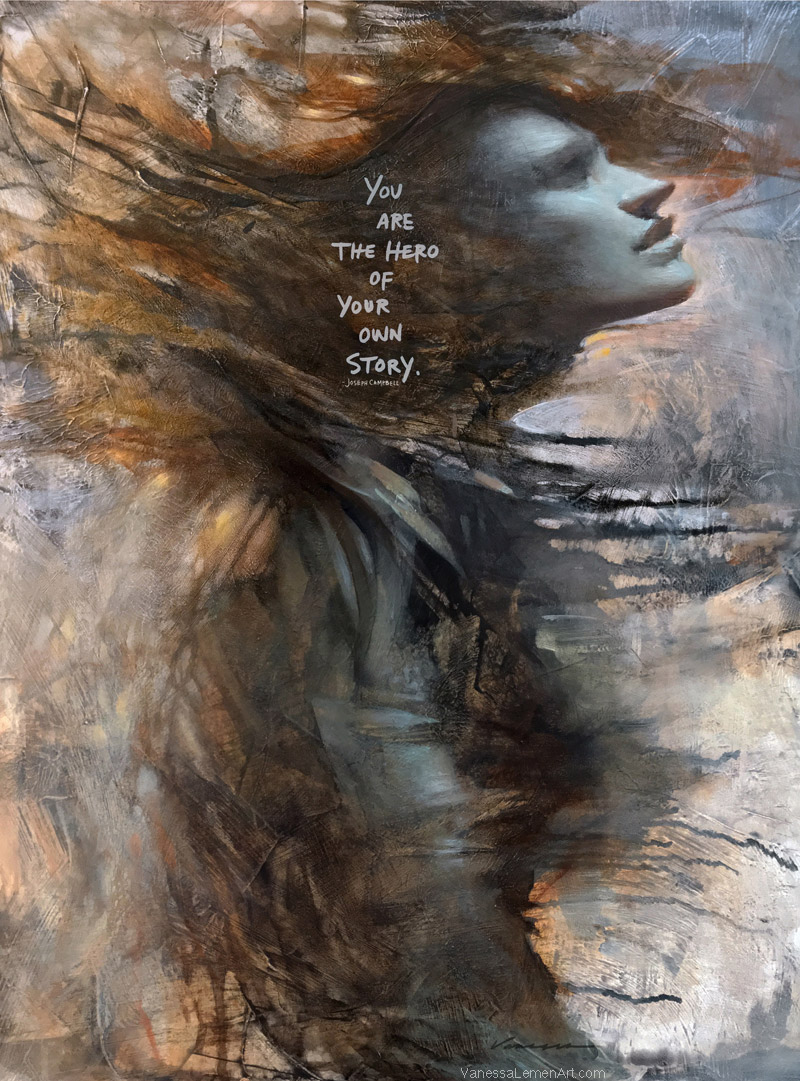 |
| “You are the hero of your own story” -Joseph Campbell / painting by Vanessa Lemen |
There is a quip that I heard recently and it’s one that I’ve heard said a handful of times over the years by other artists. It’s usually uttered by artists who are younger or less experienced. In discussing art with these folks, when the subject comes up in which the artist is in conversation with someone and that someone asks them about their work, the artist returns with “I don’t like to explain my work. I think the art should speak for itself.” This answer reminds me of that funny etiquette tip we learned when we were younger – that when someone offers you a mint, you should accept it without question. It might be that person’s polite way of telling you you should seize the moment. Take the mint. Answer the question. Because maybe, just maybe, your art isn’t speaking for itself like you think it should. (which could actually say a lot about the artwork itself, but that’s a whole other can o’ worms that I might tackle another time in a different post)..
When an artist answers a question about meaning with “I don’t like to explain my work,” I’m not sure if they’re aware of this, but it comes across as either arrogant, disinterested in the person asking, or that they don’t really know what it’s about themselves. I’m guessing that they’re actually unaware of how to speak about their work.
This kind of quip also puts the others in the conversation in an awkward position. In many cases, the person who asked the question was probably asking because it is unclear, in which case, the artist replying with “I think the work should speak for itself” is basically grinding the conversation to an abrupt halt, leaving the person who thought to ask the question refraining from speaking, when in their head, they’re saying “yeah, that’s why I was asking. Because it doesn’t speak for itself.”
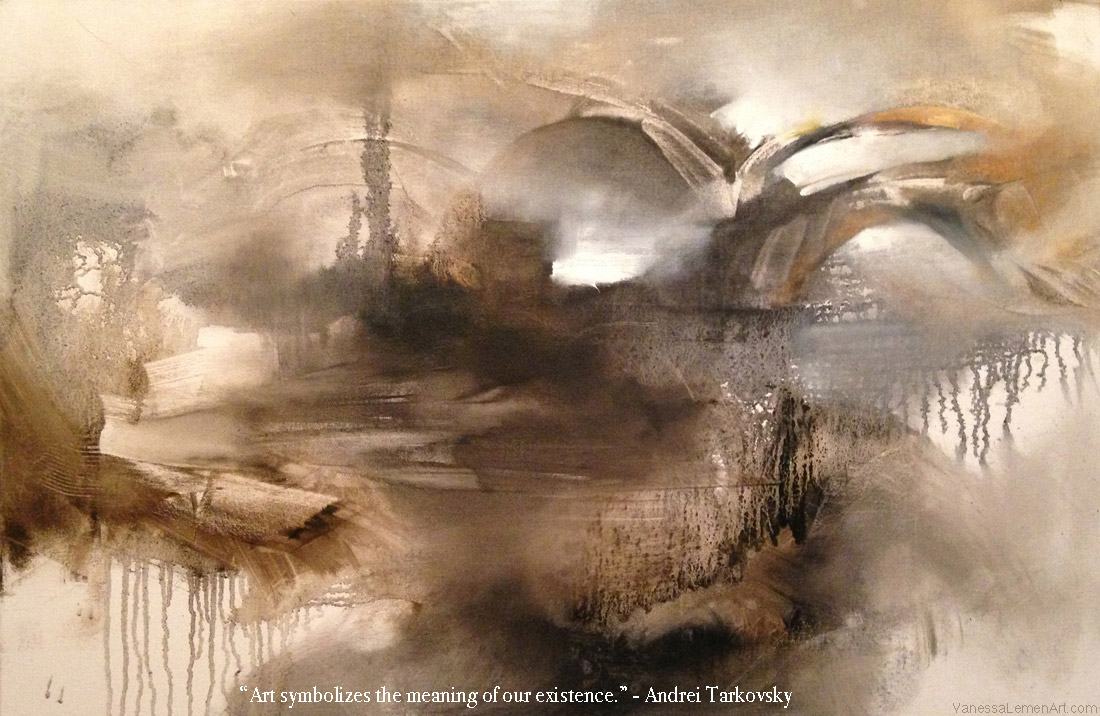 |
| words by Tarkovsky / painting by Vanessa Lemen |
Here’s the thing: You should know how to talk about your work. Period. And you should know how to talk to other artists about their work. Heck, you should be thrilled to talk about art – yours, others’ work, art history, all of it! You should know how to ask questions, and engage in conversation about meaning, breadth, process, what moves you – in your own work and in others’ work, and in life in general. This is what you live. This is what defines you. This should be just a regular conversation topic for you. And just like any conversation about anything else, there’s an ebb and flow. Things might go in random but not-so-random directions, and you should be able to go with the flow as you would any other conversation about anything else. And especially if you are at an art event, where your art is being shown, you should be ready to have a conversation about it, and not be at the ready with quips to shut the conversation down.
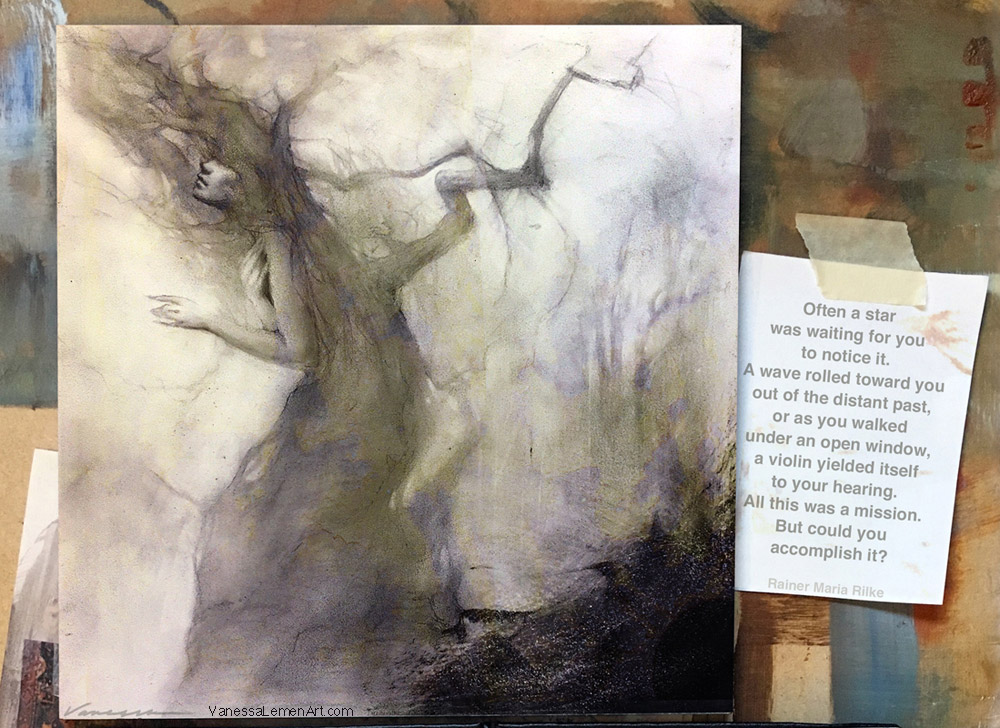 |
| words by Rilke / mixed media by Vanessa Lemen (also part of my contribution to ArtOrder’s The Journal) |
And you should be able to listen as well. To really be present and hear what’s being said and asked and presumed. You should be able to own that energy that you exude instead of putting up a wall at someone when they show a curiosity and interest in your work. Because that could very likely be what they’re doing when they’re asking you questions about your work. If you have insecurities about talking about your work, don’t project that onto the person asking the question. Instead, use those opportunities to start practicing and learning. Do it in real time – in those circumstances, with real people asking real questions. They want to know. Why (and how) do you make art?
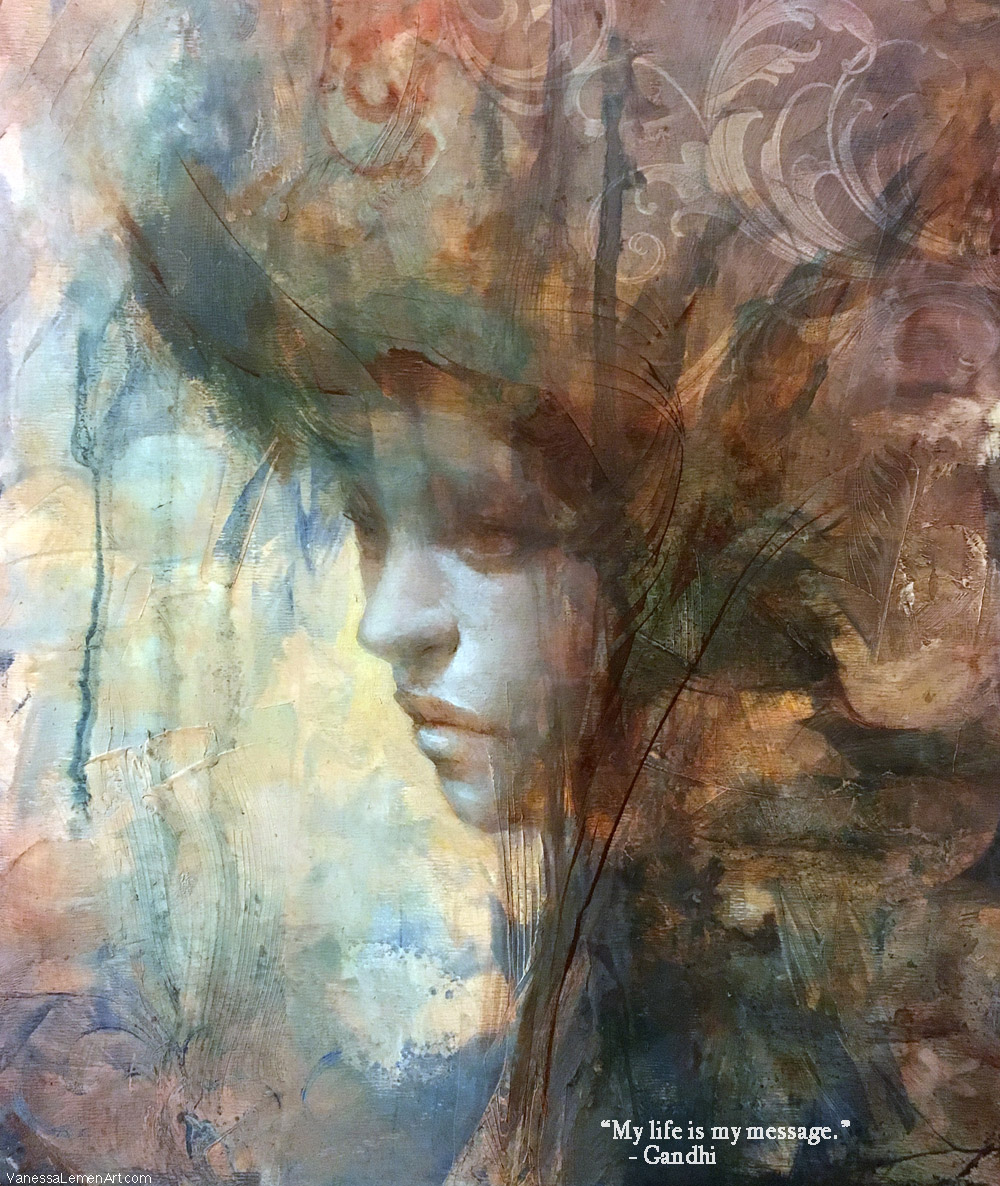 |
| words by Gandhi / painting by Vanessa Lemen |
And if it’s your own work that you have a tough time speaking about, then you owe it to yourself to own up to it, and then try making a point to ask other artists questions in order to gain an understanding about how they might approach this type of conversation. And then listen, take it all in, let them speak, and hear what they have to say. Use those opportunities to learn, glean from them, and make use of what you get from it in your next conversation with others. Don’t act like you know everything to cover up your lack of knowing. You’re human. We’re all human. We all can always learn more than what we already know.
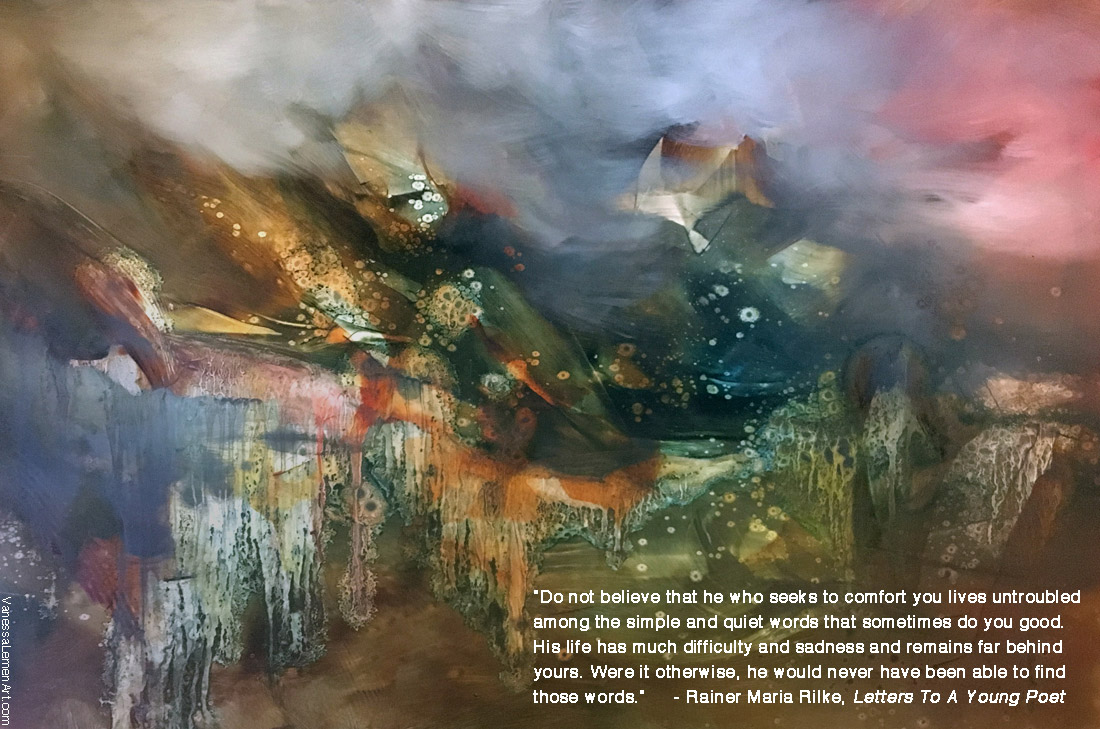 |
| words by Rilke / painting by Vanessa Lemen |
If you are someone who’s reading this and thinking “hey, I think saying ‘I don’t like to explain my work’ is perfectly fine, and there’s nothing wrong with that,” then here’s my advice: First, think back to those conversations, and how they continued after you said that. They probably didn’t. If the big reason you don’t think there’s anything wrong with it is because you secretly wanted to shut down the conversation, then by all means, you’ve achieved your goal. And I suppose that’s somehow satisfying if that was your intent. (Although, I suggest restructuring your goals, if this is one of them). But then don’t sit around wondering why someone’s art is doing well, when you just don’t get it. And you can’t wonder why people have stopped talking to you about your art in any other way than one-liner comments on social media – if that.
Or, try answering the questions the next time that type of conversation comes up, and probably no one will ever know but you that you took the advice from someone whom you’ve outright wondered why their art moves and inspires people ..and how or why it also *gasp* sells. Being an artist is not a slick package deal that gets handed to you by rubbing elbows. It’s about real genuine connections with people and with your art, and it’s working hard at what you do and understanding that working hard doesn’t necessarily mean throwing everything and the kitchen sink into every painting or just churning more and more work out at the expense of learning, but rather it means truly immersing yourself into your work, and being present in all its stages. Oh, and that’s not necessarily easy. Albeit, some people might make it look easy because they’ve been doing the work a long time, they’ve been through the highs and lows of it because they truly love it and they want to learn more and do more of it every day. They wouldn’t have it any other way. They live and breathe their art. To talk about it comes with the territory. It’s their life.
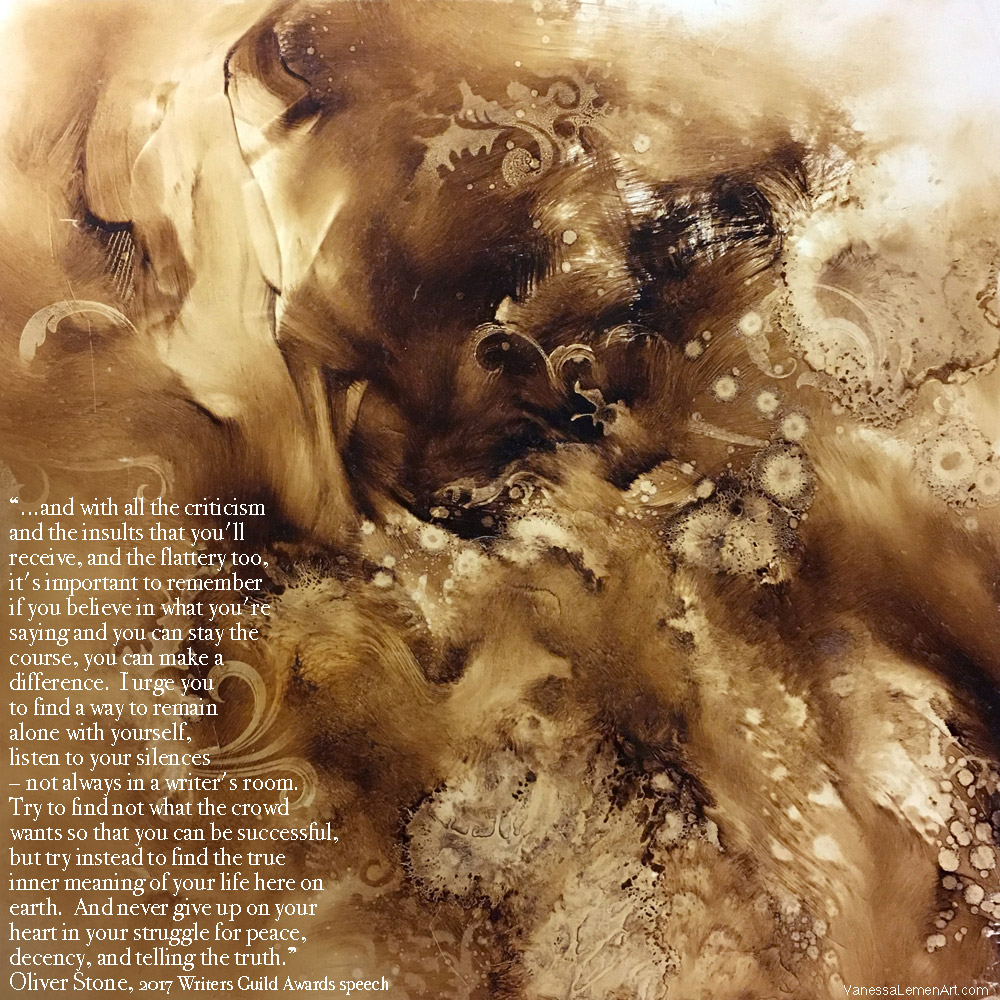 |
| words by Oliver Stone / painting marks by Vanessa Lemen |
So, here is a list of questions to answer that might help you on your quest to conversing more naturally about your work.. if you so choose:
**note** This doesn’t have to be painful. You don’t even have to think of it as if you’re writing an Artist’s Statement, but this is essentially what an Artist’s Statement should include as well. Just answering these questions below – just for yourself – and really giving them some thought will help you in conversing about your work the next time it comes up. And practice saying them aloud. If it’s difficult to conjure up a scenario in which you’d be answering these questions, then think of it as if you’re explaining your work to someone who’s new to going to an art event or even better yet, try thinking of it as if you’re describing your work or yourself to someone who actually can’t see. (No, really, it’s a very helpful way to think about it).
• Why do you make art? You can choose to start by answering more specifically Why do you make this type of art, or why do you choose to paint this subjectmatter (or how does it come about)? And then go from there..
• What inspires you and how does that influence your work?
• What medium do you like best? Or why do you choose to work in the medium you work in?
• What does your artwork mean? What does it represent? Try answering this as briefly as possible – enough to keep someone else engaged (if you were explaining it to someone else), while not necessarily directing them how to view it.
• What does your art mean to you? This is about your own understanding of your surroundings and how you interpret and filter that, but again this is not to be used to direct others on what your art should mean to them.
I hope you find this useful. I look forward to bumping into you sometime in the future and having a genuine dialog about art or anything else that might come up.
 |
| words on left by Simon Schama, words on right by Emerson / mixed media sketch by Vanessa Lemen (also can be seen in ArtOrder’s The Journal) |


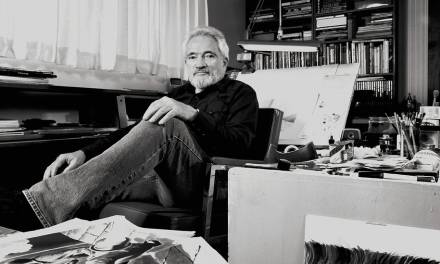

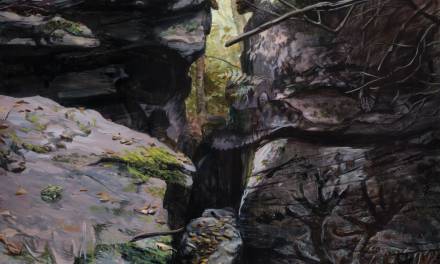

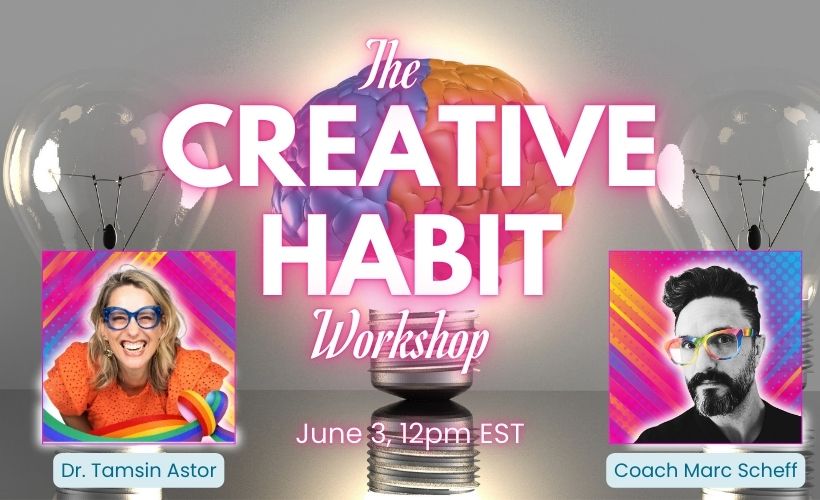
Well… I guess it's time for me to do some introspection XD
I would never shut down a conversation about my art with someone else and I could definitely explain the thought process, inspirations and techniques of specific pieces. But answering the more abstract questions like ''Why do you make art?'' or ''What does my art means to me?''… that's hard!
Gosh I have such a terrible time with these questions. I make art because I want to see things become real that nobody else is bothering to make. I can talk about specific pieces too – but some sort of overarching generalization about why I make art? I just don't have one other than what I just mentioned.
What a wonderful post. Thanks for taking the time to do this Vanessa.
All of it's linked – so, if you can explain the thought process, inspirations, and techniques, then if you really want to know about yourself, use those as your springboard for breaking down the more abstract. It's not as abstract as you think. But to first answer it, and make the feeling of it being abstract less daunting, answer it in a straight forward manner – Why do you make art?.. I like to doodle. I love the smell of paint (- it reminds me of..) ..or I like to create worlds that I'd like to live in.. Just keep spouting things off in a stream-of-consciousness kind of way.. and then take a look at them all and make the connections there.
“I make art because I want to see things become real that nobody else is bothering to make.” Yep, there's your answer. You could actually work backwards from this answer to discover a bit more about the why.. what is no one else bothering to make? What about it, I mean. Fantastical landscapes, or colors that don't exist in nature, or the tough concepts that are difficult to talk about.. or.. ? It could go in so many directions, but you know what it is that you are drawn to or want to see developed.. What is everyone else making and why do you think that's what they're making? And, to me, the best part of what you said in that one sentence is that you 'want to see things become real' – I agree! I love that.. but I may have a completely different reason than you have for saying that. The fact that by making it, you've made it real is just so great right there.
Thank you! I'm glad you enjoyed it. Thanks for taking the time to read it and leave a comment. 🙂
Great Article without beating around the bush around the fundamental questions.
A disclaimer with what is about to follow – I agree on all of the points that you are stating and feel that the verbalization of ones work is just as important as the visual manifestation of it. In fact, the art usually gets better the clearer and more focused the textual explanation is.
That being said, I have to play the devil's advocate on the topic. On the other side of this coin are artists who over-explain their art and paint over it with their words whereas their level of skill isn't nearly sufficient to warrant such words. Especially in Western Art & especially-especially in Western Art Universities, it has become a trend to value the concept and idea over the knowledge and effort required to produce quality work. This has created a bubble in which art is perpetuated by high-society snobs and promoted around via networking, not because of the quality of work, but because of who you know, or where you come from. Furthermore, this creates a disinterest in the classicist knowledge of aesthetics with young artists regarding it as a limitation to their creativity. But how can you break out of the box if you are not aware of it in the first place?
As another argument, something that you've gone through a bit in the article itself, is the awareness (or lack-thereof) that young-lings in general have towards such topics. The emancipation of the mind to be able to clearly formulate and be sure of the questions you are posing are quite difficult to achieve and some don't achieve it at all in their entire lifetimes. This has a lot to do with how much literature the artist covers parallel to their work (as well as what type) which I wonder if it should be imposed as a requirement to anyone interested in the process of creating. As I stated above, the work does usually get better with the verbalizations, but I also know that for many the process is a non-verbal release/therapy to channel something that they are unable to understand in the first place. For example, many of my favorite painters derive their inspiration from Lucid Dreaming – a place of little words and lots of lights. I shall take Jon Harris (who's at the top of my list, but a part of many) who while creates extraordinary art, but has quite esoteric and fleeting explanations of the why and way he does things which in many cases creates confusion instead of elaboration.
While clearer and more focused thought makes for an overall better person, we must be careful and aware of the dangers and explanations the other side of things poses.
hi Nerses. Thanks for the great reply. All great replies thus far, actually, and yours is one. I agree with you about all you've mentioned. I had done so much editing because honestly, this article could go in many directions, and I tried to keep it focused on the artist who says “I don't like to explain my work. I think the work should speak for itself.” This is usually a cop-out in a situation where they're unsure how to respond, and the tone in which I've pretty much always heard it said is in a condescending manner so as to shut down the conversation. So, that's specifically what I was referring to (without getting too much into that). I agree that there is also the flipside and I mentioned at the end of the first paragraph how their art might actually not be speaking for itself and might be lacking in other ways, but again, that would be better to address in another article, I think, so that this one didn't get out of hand and lengthy. As for artists who work from lucid dreams, well, by saying that they're described their work. I have had conversations with John Harris about just this as well as how our art has some similarities in that we are working in this way, and that it's tough to wrap words around. But I stress here that 1) He is quite able to have conversation about his work – I've talked with him about it at good length and I was not confused at all by what he said in fact we were quite on the same page, and probably could have talked for hours about it.. and 2) as a general point not specific to John Harris but to artists who might work more in this way (like me, for example), it still can be talked about, and can be quite helpful for the artist as well as others to have that dialog because it gives us (all) a peek into that window of how we work differently (or in mine and John's case, how we work similarly), and how our viewpoints and methods of 'conjuring' images can still arrive at something quite tangible and relatable to others who might not work in the same way or even come from the same perspective. It's helped me so much to speak about my work. And believe me, I also know when not to (because there are times when that really is best).. but just to clarify, the circumstances that I'm referring to in my experience I'm speaking about in this article are when it's actually necessary to at least understand why knowing how to speak about your work is such an important thing. I could really go on about this too.. but I'll try to keep a bit shorter for now. One more thing though, and it's in answer to your last sentence.. Yes, that's a given – and a factor learned by doing/experiencing. And it applies to all things.. not just art. When I write here, I keep it focused on art because that's the nature of this blog, but many of my articles are inspired by a conglomeration of all my experiences, art included. Thanks again.
Terrance Mckenna talked about art as a form of Shamanism, that is you're bringing forth what is primal and/or qualities of the ideal. Most of the art that is brought upon us commercially is bottom line urges of gratification rather then spiritual reflection. When the spiritual is introduced you transcend instant gratification, something more eternal.
https://www.youtube.com/watch?v=0KB-nXSWr1Q
It is nice to hear a professional artist give “permission” to talk about art, where in other situations I have definitely heard that art should speak for itself and asking about it (or explaining your own) is a naive thing to do.
I'd imagine we all paint because we're really excited or passionate about what we paint. Personally, even though words cannot express what the art can (hence the need for the art!), I am excited enough about what I am trying to say with my art that I like to attempt to say it in words. There is certainly an element of “If I could explain it, it wouldn't need to paint,” but that doesn't mean we shouldn't try to have a conversation about our art.
I agree about art having the spiritual reflection/transcendental/eternal qualities/power/potential. And sharing in a dialog with others about it – both verbally and visually – can be so enlightening for everyone involved in that dialog. Great words and insight from Terrance McKenna in that link. Thanks for sharing, Paul.
Answering in two parts:
1) I understand what you're saying about not having to explain the art, and it's not the first time that's come up and/or artists have had that notion. And I agree to certain aspects of it. I made note of that at the end of the first paragraph briefly that the art should speak to the viewer (if that is its intention), and if it isn't, then the art may be lacking in some way. Like Nerses was saying above, too, there are artists who tend to put words to their work that's overdoing it – the words are a bunch of fluff added to an otherwise not-so-intriguing piece of art. And that's why I didn't want to get to into going in that direction because it was another topic that would definitely deserve to be discussed, but perhaps in another article. There are certain situations when the artist has the opportunity to converse with people at a show where their work is being featured or to converse with other artist friends in a more intimate setting, that I believe the artist should not close themselves off from those types of conversations. We all can really learn a lot from those conversations – we can learn a lot about ourselves as well as about others – our viewpoints, perspectives, perception, interpretation, history, etc – and all of that comes into play when making art. (We can also learn a lot about the artist who tends to be inclined to shut down conversations especially with other artist friends in an intimate setting, but again, that's a different topic). This communication is a part of who we are and why we make art. Communication is key to being for us. It's not about just one person telling another about what their art means. In fact, it's not about that at all. It's about opening ourselves up to taking in more, which then adds to us making more art, with that new experience stored away in our subconscious, and so on.. I know that many artists who think that they shouldn't talk about their art were somewhere down the line been fed that notion – it's a mash-up of opinions where discussion and conversation got rolled in with *explaining what your work means* and/or *making others see things the way you see them* but that's not what a dialog should be, and that's definitely not what I mean when I say we should be open to talking about our work. I'm referring to having an *open* discussion with the possibility of new/different – more for us to add to our experience. I'm glad you got a new perspective from reading this. I learned a bit more about others' perspectives based on these comments to the article too. My perspective comes from a varied combination of background on this – of having gone through an education system and discussing/critiquing work (a balance of having to be able to talk about your work and others' work at the same time as not putting content to the work that simply isn't there in the work – you will get called out on that if you attempt it in certain crowds! ha), having a dialog with my own canvas and painting in a responsive way while also having the experience of being educated in a formal training experience, having a dialog with other artists/people/non-artists/etc in a number of scenarios, assessing the world in my surroundings, curiosity about the things I don't know, personal reflection, non-art experiences.. I could go on.. but.. I did want to say that it wasn't my intention to give *permission* necessarily (I get what you're saying by saying that way), but I see from your comment that reading this helped to possibly gain a different perspective about discussing art, and hopefully the notion to see it differently (not as a negative thing like it has been told to us that it is because there are some out there that have given it a bad name) and in turn to attempt it, and that's great. 🙂
2) It got long.. what can I say.. Lol
..As you may know if you've seen my work or read other articles I've written, my work comes from a dialog with the canvas based on what I have stored away internally, marks become forms that become pictures that stem from a spiritual connection of sorts. That dialog could never be uttered verbally in the same way that the connection was made between me and my painting. The picture is the result of that, and in turn, speaks to others – and I leave them to having their own discussion with it. Maybe it will be similar, maybe it won't be (it usually is similar with variances).. but that's a separate dialog to be had, and I'd still love to discuss art and life with those people as well. I wouldn't tell the viewer of my work that they're not having the correct response, just as I wouldn't tell someone who's viewing my work that I won't discuss my work with them because they should have their own response. Most likely, they do, and that's why they thought to ask about it. The dialog doesn't have to be specifically about that piece they're looking at, but it's the impetus for more – a conversation with someone I might not have had the chance to speak with otherwise, a deeper connection, who knows what could come of it.. just more..
Honestly? I have no idea why I create art. I've drawn in some form or fashion since I was old enough to hold a pencil. When I was a teen, most of my stuff was comicbook oriented. Now I spend time doing figure studies and portraits. I don't think I have some sort of message about myself that I wish to share. Though I will admit that lately I do it more out of a sense of obligation ( use it or lose it!) than passion or enjoyment.